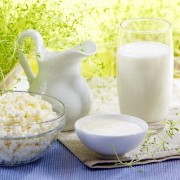 Photo: Getty Images
Photo: Getty Images
An article in Webmd.com, "Vitamin and Mineral Supplements for Women: a look at women's vitamin and mineral needs, food sources, and supplements", by Peter Jaret, reported that many physicians are saying that we can not expect a pill to provide the same benefits as eating the right foods.
“There are hundreds of compounds in fruits, vegetables, whole grains, and other foods from plants that work synergistically in ways we haven’t even begun to understand,” says David Rakel, MD, director of integrative medicine at the University of Wisconsin.
Calcium and Vitamin D are very important for strong bone health in women of all ages, however, most women believe that taking a supplement every day is enough to keep their bones healthy throughout their lives. Robert Heaney, MD, a Creighton University professor of medicine and an expert on calcium and vitamin D says, “The body needs both calcium and protein for bone health, so the ideal source of calcium is dairy products, not supplements.”
Calcium: The Institute of Medicine (IOM) recommends 1,000 mg of calcium for adults every day and 1,200 mg for women over age 51.
The following foods will help maintain the calcium levels needed on a daily basis:
8 ounces of yogurt: 415 mg
8 ounces of milk: 300 mg
3 ounces of salmon:181 mg
Orange juice is also fortified with extra calcium as well as plant-based sources of calcium such as tofu and leafy greens.
Some women cannot tolerate dairy or some of the other calcium-rich foods. In that regard, the IOM still encourages taking calcium supplements to meet your daily requirements.
Calcium supplements are often costly, so you can opt for calcium carbonate tablets, which are the least expensive. Taking them at mealtime can help with stomach digestion. If you have a history of low stomach acid, calcium citrate may be more effective.
Vitamin D is also essential for bone health as well as other conditions such as fatigue, joint pain, high blood pressure and certain types of cancer. The IOM recommends 600 IUs of vitamin D per day for most people. Supplements can help, but Dr. Heaney suggested that getting a little sun every day without sunscreen is the best source of Vitamin D.
“If you measure blood levels of vitamin D in people who work outside during the summer, they typically reach 60 to 80,” Dr. Heaney says. “So that may represent the number that the body evolved to maintain.”
Experts still advise putting sunblock on your face because there is a higher risk of skin cancer on the face. If it is impossible for you to get outside every day or live in the north where it isn't as sunny, talk to your doctor about the right dose.
Sources:
Vitamin and Mineral Supplements for Women by Peter Jaret
http://women.webmd.com/features/vitamins-minerals-for-women
Dietary Reference Intakes for Calcium and Vitamin D - Institute of Medicine
http://iom.edu/Reports/2010/Dietary-Reference-Intakes-for-Calcium-and-Vitamin-D.aspx
Reviewed August 5, 2011
by Michele Blacksberg R.N.
Edited by Jody Smith





Add a CommentComments
There are no comments yet. Be the first one and get the conversation started!